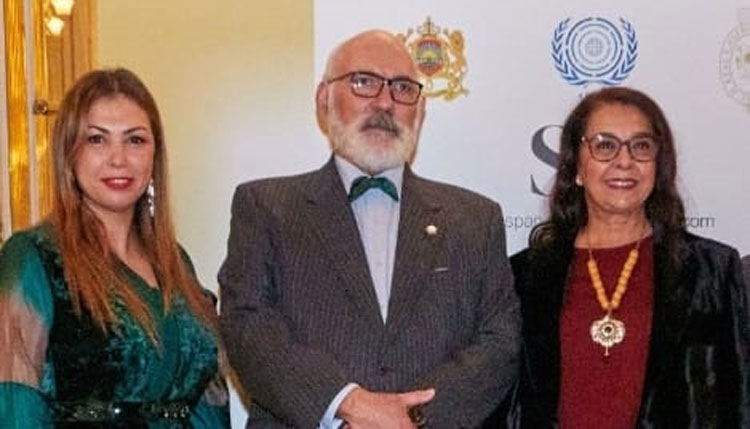Arturo Perez Martinez
Ambassador of Spain
The NGO Paz y Cooperación enjoys ‘consultative status’ at the United Nations. The principles and ideas that govern the Organization therefore inspire and are always present in its work. One of them is to remember anniversaries such as October 24, 1945, that is, 78 years ago, when the UN was created. This month we commemorate the anniversaries of the Declaration of the Rights of the Child (20-11-59, 64th Anniversary) and of the Convention on the same subject (20-11-89, 34th Anniversary), to culminate the year with the 75th Anniversary of the Universal Declaration of Human Rights (10-12-48), all of which were born in its midst.
Born from the ashes of World War II, the United Nations is a commitment to peace, cooperation and the betterment of our shared world. A beacon of hope and unity on the global stage.
The formation of the United Nations was, as they say, a response to the catastrophic events of the two world wars. Its founding members were motivated by a collective determination to avoid a repetition of such devastating conflicts.
The fundamental objective was to create a platform where nations, large or small, powerful or vulnerable, could come together in dialogue, fostering understanding and cooperation on a global scale. Governments and NGOs were invited. 51 states were present at the creation. But the good wishes were not always well reciprocated: the cold war, the veto….
Today, conditions are different from the initial ones: there are new problems and new threats: drug trafficking, terrorism, biological weapons, nuclear weapons, environment, pandemics, etc. The UN must adjust to the new reality and not be an obsolete international organization. To this end, there have been appropriate calls for reform or modernization. This will also be discussed below.
The United Nations operates through a well-structured system of organs, each with its own distinct functions and responsibilities.
One of the most important roles of the UN is its involvement in peacekeeping operations around the world. Through these missions, the UN aims to stabilize conflict-affected regions and facilitate the peace process.
Peacekeeping troops, composed of personnel from several member states, work tirelessly to maintain order, protect civilians and support the implementation of peace agreements. It must be emphasized that these efforts often involve highly complex negotiations, ceasefire monitoring and post-conflict reconciliation to ensure lasting peace and stability in the affected regions.
The United Nations is also at the forefront of providing humanitarian assistance to communities affected by natural disasters, conflicts and other crises. Organizations such as the World Food Programme (WFP) and the United Nations High Commissioner for Refugees (UNHCR) play a crucial role in delivering essential aid, including food, shelter and medical supplies, to those in need.
In addition, UN development agencies, such as UNICEF and UNESCO, focus on initiatives aimed at improving education, healthcare and cultural preservation, thereby fostering sustainable development and improving the quality of life for people around the world.
In 2015, the UN introduced the Sustainable Development Goals (SDGs), a comprehensive set of 17 global goals aimed at addressing some of the most pressing challenges facing humanity. These goals range from eradicating poverty and hunger to promoting gender equality, clean energy and responsible consumption.
The SDGs serve as a roadmap for governments, businesses and civil society organizations to collaborate and work together to build a more equitable, prosperous and sustainable world for future generations.
Through initiatives such as the Paris Agreement, the UN encourages nations to commit to reducing greenhouse gas emissions and transitioning to renewable energy sources.
They also organize international conferences and summits to raise awareness of environmental issues and encourage collaboration between countries to protect the planet’s natural resources and biodiversity.
The UN has been a strong advocate of human rights and has played a crucial role in promoting and protecting the fundamental rights and freedoms of all people around the world.
The Universal Declaration of Human Rights, adopted in 1948, is a testament to the United Nations’ commitment to uphold the inherent dignity and worth of every person, regardless of their origin.
The UN Human Rights Council works diligently to monitor and investigate human rights violations around the world, striving to hold perpetrators accountable and ensure justice for victims. Some want a greater role in global affairs and others want it to be limited to humanitarian work.
There are many voices in favor of increased Security Council membership. Others want a change in the way the Secretary General is elected, and fewer want a Parliamentary Assembly. For some, the United Nations acts in the service of the powerful and not of the citizens.
The veto is used most of the time to protect the interests of the 5 permanent members of the C. of S. by preventing decisive action to safeguard peace and security. The General Assembly cannot replace it as its power is limited. In addition, the functions of the SG are not clearly defined.
In conclusion, the United Nations is a cornerstone of global cooperation and strives to create a more peaceful, just and sustainable world for all. Its tireless efforts in the fields of peacekeeping, humanitarian aid, sustainable development and human rights serve as a testament to the power of international collaboration.
While the challenges facing the world may seem daunting, the United Nations continues to inspire hope and unity, fostering a vision of a better and more equitable world for generations to come.
© All rights reserved





